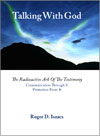In the Spirit of Lexical Curiosity
In the spirit of lexical curiosity, which originally drove me to write Talking With God, I did a bit of Google research to see how people are accessing information about the same ancient words I studied. What I discovered was almost as surprising as what turned up in my primary research, namely that public discourse tends away from the words’ original, technical meanings and shifts to mystical/theological concepts.
Take Moses’ ark for example. In the Hebrew Bible, “ark of the testimony” (edut), found in Exodus, Leviticus, and Numbers, shifts to “ark of the Covenant” (b’rith) in Deuteronomy and the following books. (See two exceptions in my Appendix A.)
Central to my book is the fact that the word edut, meaning the stones Moses received from the Lord on Mount Sinai and kept in the ark, has the sense of communication, not testimony. My retranslated terminology is “ark of communication.” Thus, my subtitle is Communication Through it.
Why does the same box have two totally different words relating to it?
Now the surprising facts:
- In Deuteronomy and the following books, edut is no longer connected to the ark and there are no instances of edut meaning stones.
- For the first time, (Deuteronomy 4:45) the meaning “testimony” is closely related to edut, shifting from a technological component to the theological concept, e.g. Because you…have not obeyed the voice of the Lord in His law, in His statues and did not walk in His testimonies (edut).” (Jer.44:23). This meaning doesn’t exist in Exodus, Leviticus, and Numbers!
- The concept of the ark containing stones is replaced by “ark of the covenant” (b’rith) in Deuteronomy and the following books.
What’s happening here? I believe the eventual substitution of b’rith for edut signifies the end of the Israelites’ use of the ark as a communication device. Then, not understanding its technical nature, later writers supplanted it with theology.
How does this impact our understanding today? Google etymology reveals that only 320 people around the globe search for the more ancient “ark of the testimony” on a monthly basis, but 60,500 search for “ark of the covenant!” In other words the theological has taken root in exactly the same way it did thousands of years ago!



This reminds me of what i have learned about the word Faith when you study the ancient Greek meaning, tends to mean Understand instead not just blind faith but they understood so much that they almost had no choice but to believe. It was so clear to the people that they were willing to die for Christ or God.
Yours is a perfect analogy and most interesting! Did you have a chance to go to my videos of my interpretation of various words? It’s in much more detail in the book, but you’ll get an idea anyway.
I would appreciate any further comments you might have. Best regards, Roger